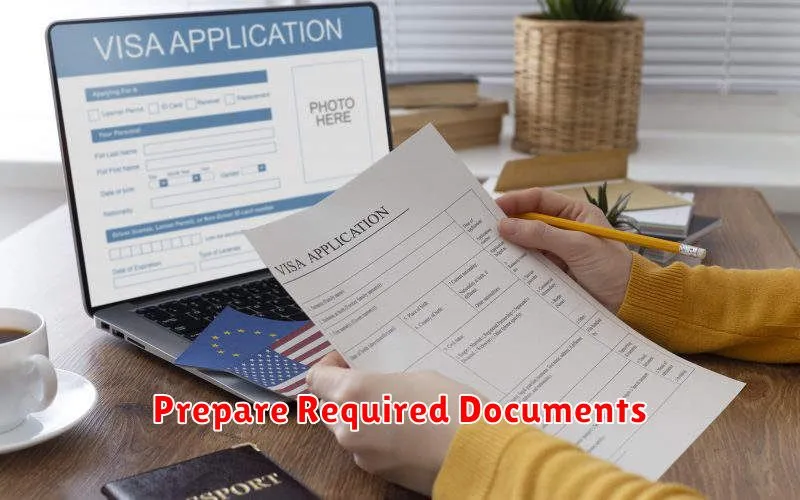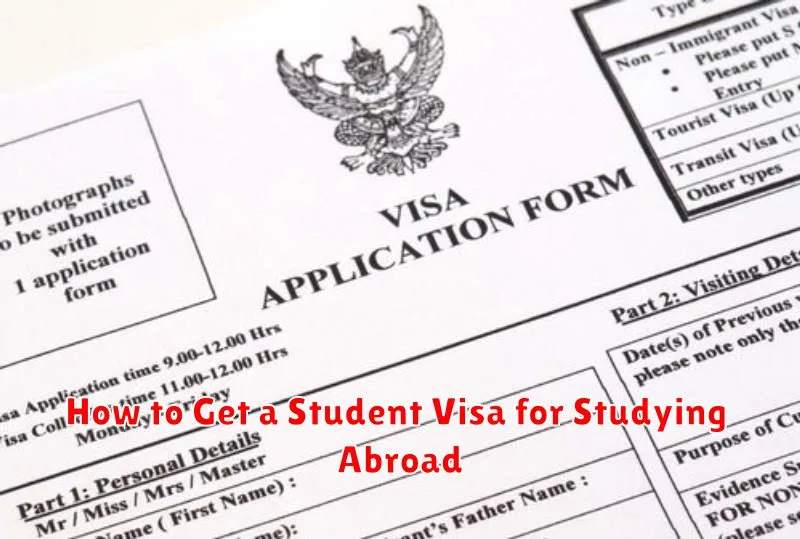Planning to pursue your academic dreams in a foreign land? Securing a student visa is the crucial first step. This comprehensive guide provides invaluable insights on how to navigate the often complex process of obtaining a student visa for studying abroad. Whether you’re aiming for a prestigious university in Europe, a cutting-edge program in Asia, or an innovative course in North America, understanding the student visa application process is paramount to realizing your international education aspirations. We’ll cover everything from eligibility criteria and required documents to application procedures and interview preparation, ensuring you’re well-equipped to successfully obtain your student visa.
Studying abroad offers a wealth of benefits, from experiencing new cultures and expanding your global network to gaining a competitive edge in the job market. However, the student visa application process can be daunting. This guide will demystify the process, providing clear, concise, and actionable information to help you secure your student visa. We will address common concerns, highlight potential pitfalls, and offer expert advice to help you navigate the specific requirements of your chosen destination. Begin your journey toward studying abroad with confidence by understanding the intricacies of obtaining a student visa.
Understand the Visa Process by Country
Visa requirements vary significantly depending on your nationality and the country you plan to study in. It’s crucial to research the specific process for your situation.
Generally, each country has its own student visa category. The process usually involves completing an application form, submitting supporting documentation (such as academic transcripts, proof of financial resources, and a letter of acceptance from your institution), and attending an interview at the embassy or consulate.
Processing times can also vary significantly, so it’s essential to apply well in advance of your intended travel date. Delays are possible, and some countries have peak application periods.
Key factors influencing the visa process include:
- Your nationality
- Chosen study destination
- Length of your program
Prepare Required Documents

Gathering the necessary documents is a crucial step in the student visa application process. Requirements vary based on your chosen country and institution, so carefully review the specific guidelines provided by the embassy or consulate and the educational institution.
While specific requirements differ, common documents include:
- Valid Passport: Ensure your passport’s validity extends beyond your intended period of study.
- Acceptance Letter: You’ll need an official acceptance letter from the institution where you’ve been admitted.
- Application Form: Complete the visa application form accurately and thoroughly.
- Financial Documents: Provide proof of sufficient funds to cover your tuition fees, living expenses, and return travel. This might include bank statements, sponsorship letters, or scholarship awards.
- Academic Transcripts: Submit your academic records, including diplomas, degrees, and transcripts.
- Proof of Accommodation: Some countries require proof of where you’ll be living, such as a lease agreement or dormitory confirmation.
- Health Insurance: Demonstrate that you have adequate health insurance coverage for the duration of your stay.
- Passport Photos: Provide recent passport-sized photographs that meet the specified requirements.
Begin gathering these documents early to allow ample time for processing and to avoid any delays in your visa application.
Show Proof of Funds
Demonstrating sufficient financial resources is a critical aspect of the student visa application process. You must convince the visa officer that you can cover your tuition fees, living expenses, and return travel without needing to work illegally in the host country.
Acceptable proof of funds typically includes:
- Bank statements: Recent statements showing consistent balances sufficient to cover your expenses.
- Sponsor letters: If someone else is funding your studies, a letter from them outlining their commitment and their financial capacity.
- Scholarship/grant letters: Official documentation of any financial aid you have received.
- Loan documentation: If you have secured an educational loan, provide the loan agreement.
The required amount varies depending on the country and institution. Check the specific requirements of your chosen university and the embassy or consulate of the country you are applying to. Be prepared to provide documentation in the required format and currency.
Schedule and Attend Visa Interview

Once your application is complete, the next crucial step is scheduling your visa interview. This typically involves creating an online account with the designated visa application center or embassy/consulate website.
Be prepared for a wait time, as visa appointment availability can vary greatly depending on the time of year and demand. Check the website frequently for updates and book the earliest available slot.
Attending the interview is mandatory. Dress professionally and arrive on time, ideally 15-20 minutes early, to allow for security checks and document processing. Bring all original documents and required copies as outlined by the specific embassy or consulate guidelines. Commonly requested documents include your passport, I-20 or DS-2019 form, acceptance letter, financial proof, and SEVIS payment confirmation.
During the interview, be prepared to answer questions about your academic plans, chosen program, financial stability, and ties to your home country. Answer truthfully, concisely, and confidently. It’s crucial to demonstrate your intention to return home after completing your studies.
Pay Required Fees
After your student visa application has been approved, you will be required to pay certain fees. These fees are mandatory and must be paid in full before your visa can be issued. The types and amounts of fees vary depending on your country of origin and the country you intend to study in.
Common fees include the visa application fee, a visa issuance fee, and potentially a SEVIS (Student and Exchange Visitor Information System) fee for those studying in the United States. It is crucial to research the specific fee requirements for your situation. Contact the embassy or consulate of your destination country for the most up-to-date and accurate fee information.
Ensure you keep records of all payment transactions. This documentation may be required for future reference or during your travels. Paying the required fees promptly is a critical step in finalizing the visa process and ensuring a smooth transition to your studies abroad.
Track Your Application Status
After submitting your student visa application, it’s crucial to monitor its progress. The method for tracking your application status varies depending on the country you’re applying to.
Some countries offer online portals where you can input your application details and receive real-time updates. Others may require you to contact the embassy or consulate directly via phone or email.
Regularly checking your application status allows you to stay informed about any required documents or potential delays. Be prepared to provide additional information if requested by the visa processing authorities.
Follow Entry Guidelines After Approval
Receiving your student visa is a crucial step, but it doesn’t guarantee entry. You must still adhere to the specific entry guidelines of your destination country.
Visa Validity: Pay close attention to the dates on your visa. It specifies the period during which you are permitted to enter the country. Arriving before or after these dates can lead to denial of entry.
Port of Entry Requirements: Different ports of entry (airports, seaports) may have specific procedures. Research these beforehand. You may need to present specific documents, such as your visa, acceptance letter from your educational institution, and proof of financial resources, to immigration officials.
Customs Regulations: Familiarize yourself with the customs regulations of the destination country regarding prohibited items and allowed quantities of personal belongings. Failure to comply can result in fines or other penalties.
Contact Your Institution: If you encounter any uncertainties or require clarification, contact the international student office at your institution. They can provide valuable guidance specific to your situation.

